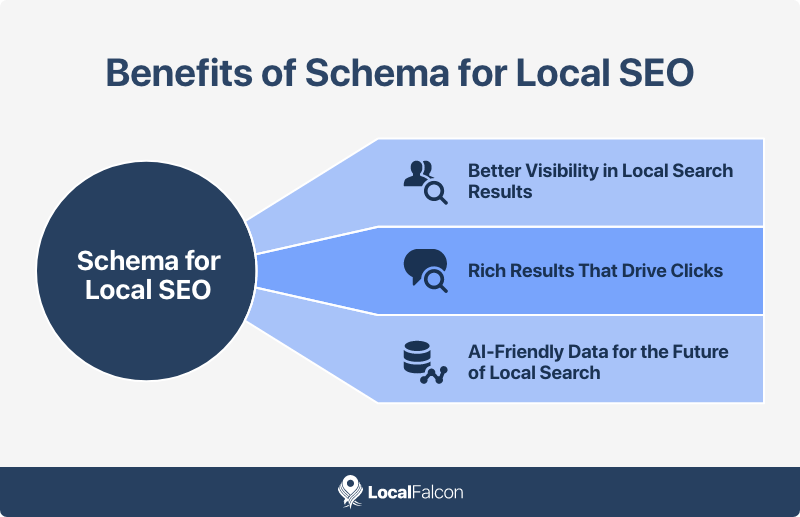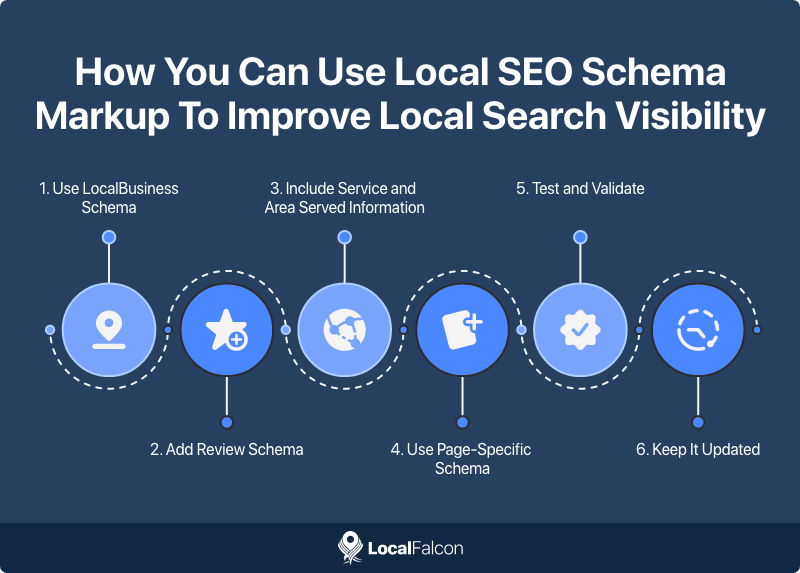As Google's AI Overviews and other AI-powered search experiences reshape how users engage with local search results, the ability for machines, especially AI language models, to accurately understand your business online has never been more important. Enter local SEO schema markup.
In this new era, schema markup continues to be a foundational tool for increasing local visibility, improving AI comprehension, and strengthening your position in AI-driven search features like Google's AI Overviews.
In this guide, we'll break down what local SEO schema is, why it's essential for your business, how to implement it effectively, and why it will play a crucial role in your future local search performance.

What Is Local SEO Schema Markup?
Local SEO schema markup refers to a specific type of structured data added to your website that helps search engines, and now AI systems, understand key information about your local business.
By using schema for local SEO, you can mark up elements such as:
- Your business name and type
- Physical address and contact info
- Business hours
- Reviews and ratings
- Services offered
- Service areas
- Frequently asked questions
This information is added in a standardized format (usually using JSON-LD) defined by Schema.org, and while it's invisible to website visitors, it's extremely helpful to search engines and AI.
Search engines use local SEO schema markup to help populate features like search results, rich snippets, and now AI Overviews, top-of-page AI-generated summaries where Google highlights key information from trusted web sources.

Why Should Businesses Use Schema for Local SEO?
Implementing schema markup for local SEO gives your business a strategic edge in three important areas: visibility in search results, clarity for search engines, and understandability for AI models.
1. Better Visibility in Local Search Results
When it comes to local search, Google prioritizes businesses that provide accurate, consistent, and clearly structured data. Using schema for local SEO ensures your business info is clearly defined and more likely to be surfaced in relevant local searches.
On the other hand, inconsistent, out-of-date, or missing structured data can lead to missed opportunities, or worse, misinterpretation of your business details.
2. Rich Results That Drive Clicks
Schema markup allows your site to display rich snippets, those enhanced Google SERP results with star ratings, product availability, images, and more. These visually enhanced listings tend to have higher click-through rates because they provide more upfront information and instill trust.
Rich results generated through local SEO schema markup can include:
- Star ratings from customer reviews
- Event details
- FAQs directly in the SERP
- Menus and service listings
- Opening hours
Additionally, using schema markup for local SEO may help your business get featured in Google Knowledge Panels, another type of rich result.
3. AI-Friendly Data for the Future of Local Search
This is where things get really exciting. AI search assistants and LLMs (large language models) are changing how search works. With AI Overviews, Google is no longer simply linking to results. It's summarizing the web at the top of SERPs in authoritative, AI-generated summaries. That means your business needs to be understood by AI models, not just indexed by search engines.
Local SEO schema markup helps with this by giving AI models structured, disambiguated facts. While LLMs can analyze text and content, they perform even better when they can rely on structured data signals as well. By implementing schema, you're telling AI models things like:
- "This is our exact business category."
- "Here are verified customer reviews."
- "This is our phone number and service area."
As AI Overviews and other AI-powered search tools and features become an increasingly dominant part of the local search experience, laying a solid foundation with local SEO schema can help you perform better in this new era.

How You Can Use Local SEO Schema Markup To Improve Local Search Visibility
Ready to implement or improve your schema for local SEO? Here's a step-by-step of how to approach it.
1. Use LocalBusiness Schema
The most important schema for local SEO is LocalBusiness. You can (and should) customize this further based on your business type, such as:
- Dentist
- Bakery
- AutoRepair
- LegalService
- ChildCare
These specific subtypes of local SEO schema help both traditional algorithms and AI systems categorize your business correctly.
At a minimum, your LocalBusiness schema should include:
- @type
- name
- address (structured with streetAddress, addressLocality, addressRegion, postalCode, and addressCountry)
- telephone
- openingHours
- url
2. Add Review Schema to Highlight Reputation
Reviews are a direct local ranking factor, and schema can help surface them better.
Use Review or AggregateRating schema to showcase your average rating and customer testimonials. This can improve trust and increase chances of appearing in AI Overviews that reference top-rated businesses.
3. Include Service and Area Served Information
Schema markup can include hasOfferCatalog or makesOffer to describe your services, and areaServed to define your geographic reach. This is useful for service-based businesses that operate within a specific radius.
For example:
"areaServed": {
"@type": "Place",
"name": "Austin, Texas"
}
This helps Google and AI systems associate your business with the correct geo-terms and intent.
4. Use Page-Specific Local SEO Schema Across Your Site
Don't limit schema to your homepage. Different pages across your site serve different purposes, and schema can reflect that. Applying the right structured data on a page-by-page basis gives search engines and AI a much clearer understanding of your business.
Here are examples of schema you can apply based on page type:
- About Us page: Use Organization or LocalBusiness schema to provide context about your company history, team, and leadership.
- Contact page: Use ContactPoint within your main schema to highlight contact methods, phone numbers, and customer service details.
- Service pages: Use Service or Product schema to describe individual offerings, pricing, and availability.
- FAQ pages: Use FAQPage schema to mark up frequently asked questions and answers.
- Location pages: Use unique LocalBusiness schema for each location if your business operates in multiple cities or regions.
This modular approach helps Google and AI systems extract context from the right pages, increasing the likelihood of your site being featured in AI Overviews, featured snippets, and other local search results.
5. Test and Validate
Always use the Schema.org validator to ensure your markup is implemented correctly.
6. Keep It Updated
As your business details change (e.g., hours, services, or contact info), your schema needs to be updated, too. AI systems are increasingly using real-time and recent data, so avoid relying on stale markup.
The Bottom Line
As AI continues to redefine the way people interact with search results, including local search results, schema markup is becoming an even more valuable tool in the local SEO toolbox.
Implementing schema for local SEO can help you improve your rankings and visibility by making your business more understandable to machines and LLMs. That means better visibility in AI-driven search features like Google's AI Overviews, more appearances on traditional local SERPs, and stronger trust signals across the web overall!


